Nobody would want to stay in a 19th-century hospital, where flies and rats proliferated, surgery was done without anesthesia (not yet invented), and the spread of disease wasn’t understood. [Read more…]
Endless Love by Leonard Cohen
Amazing Eighties
Eighty! You’re eighty? Eighty’s really old, right?
That’s how I used to see it when I was younger. Maybe you, too.
But now that I’m around 60, and involved with writers and writing groups, I have friends that age. Girl friends who will sit with me, drink wine, and whine about whatever. We discuss our writing, our dreams, other people, sex, wanting to lose a few pounds…
Here’s the news: Age is irrelevant. It truly is “just a number.” People age differently these days. We’re all over the map. You cannot stereotype based on a number, because people differ so substantially at this point in life.
One of my friends, MJ, is 82 and her hair’s on fire. She’s working on her second novel. Another friend, Ray, will be 90 next May. He’s published thirty books so far and there’s no end in sight. My mom is 88. She attends exercise class three times a week, has tons of friends, and loves the novels I recommend. (We had the best discussions after Water for Elephants, Cutting for Stone, and Two Old Women).
What’s going on? Weren’t these people supposed to be in rocking chairs, gazing vacantly into space? Whether due to better nutrition, changing societal expectations, or something else, elders have kicked it up a notch. They’ve been places, they’re doing things and they aren’t done yet.
And I think they have tons of information we’d all benefit from hearing.
The people who really have something to teach us are in their seventies, eighties, and beyond.
Mary McPhee, 87, wrote a book based on her blog. The book, called “Code Name Nora” is about moving to a retirement home. She is sharp, productive and independent, with her own apartment and car. Very unusual, I think, to move to a home under your own steam while you still have choices, but she did so because it was a nicer place to live at the same price as her mortgage, for one reason. I suppose the Midwestern winters had something to do with it. Mary is thriving while enjoying the security and comfort of the home. In Nora, Mary reproduces her blog posts, most of them funny or lighthearted. However, she occasionally makes an observation that reveals the thoughtful elder behind the comedic persona. For example, this is a reflection on a couple of her neighbors who are aging faster, mentally, than others:
It didn’t take much to amuse them. They were on leisure time; holding-pen time; lame duck time; they had no cares or worries in the world. Which of course was not true because they still had plenty – their families and their own health – but nature had relented a little, softening their brains so these things weren’t so sharp for them anymore. Or they had the ability to forget their cares and worries for long periods, if forgetting can be called an ability.
Mary has written twelve books so far in her life, and she’s still writing. Here’s her story.
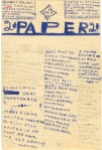 “As a child, I fell in love with words. I read constantly and collected words which I inflicted on helpless people, often mispronouncing and using them incorrectly. When I was nine, I started ‘publishing’ newspapers for my father, who traveled Monday to Friday, to tell him what had happened during the week.
“As a child, I fell in love with words. I read constantly and collected words which I inflicted on helpless people, often mispronouncing and using them incorrectly. When I was nine, I started ‘publishing’ newspapers for my father, who traveled Monday to Friday, to tell him what had happened during the week.
“I got a degree in Journalism from Oklahoma State College, but lacked confidence in my writing so mostly did secretarial work before marrying. Five children later, in my mid-thirties, I began to write. I wrote casual, humorous pieces about raising children. Over a hundred of these were published in newspapers and magazines, each earning between $50 and $150. An article on the women’s liberation movement in the 1970s was featured in the Chicago Tribune’s Sunday magazine. $250 for this. But all the time I wanted to write fiction.
“I churned out twelve novels, but I couldn’t get an agent. Then I discovered blogs, and by this time, widowed and my children grown and gone, I moved to a retirement community, and began blogging Code Name Nora. I was eighty. Some readers thought I was a fraud, a much younger person. Writing the Nora blog helped me adapt to community living. I am somewhat shy, preferring mostly to observe, but living in the Twilight Zone, as I called it, helped me to be more outgoing. I moved to my new retirement home because it’s much nicer and the rent is the same as before.
“Then I discovered self-published ebooks on Amazon. It was difficult to learn the technical aspects but I finally managed to put eight novels on Kindle. I wrote several new novels and dusted off some old ones.
“I write early in the morning for an hour or so. I used to write by hand but now on the computer. I belonged to Rocky Mountain Fiction Writers, a large group in Denver that offers critiques, but I don’t any more. I don’t have any beta readers but wish I did because writing is lonely.
I think existential angst is part of the creative make-up. Art of any kind is a way to deal with it.
“Despite what we might have to offer, people my age are frequently left out of discussions with younger people, which is hurtful. This is ironic for me because
I have never felt as creative as I do now at the age of 87.
“But then I remember when I was young and felt older people wouldn’t understand or would be accusatory. And of course, many older people have trouble hearing. (I do, and wear hearing aids.) I mostly listen but when it seems a good time to speak up, I do. Sometimes younger people laugh at what I say, and I’m not always sure what that means. Older people appreciate being listened to but they shouldn’t talk too much or about their ailments.
“I have ideas for new books but none coming out just yet. I’m busy promoting the eight books I have on Kindle. A Fresh Start in a New Place, my memoir about dropping out of big-city life at age 53, to live in a tiny Vermont hamlet, is my next promotion at which time the price will be discounted.
“My blog is MaryMac’s Booktique and my Facebook page is here. The cover for A Fresh Start uses a picture one of my daughters painted when she was eighteen and spent the summer with me in Vermont. The other image is one of the front pages of two of my childish newspapers, yellowed with age. You may need a magnifier to read them. I just include these for fun. Oh, and my blog is kind of a mess. I need to work on it.”
Lynne again: I’m 59. I admit, sometimes my sisters and I feel anxious about getting older, but then I remember people like MJ, Ray, and Mary, and I relax. We have these awesome trail-breakers forging the way for us. They are powerful role models from whom we can draw strength. I am grateful for them.
You Are More Powerful than You Think
Sometimes we perpetuate our own victimization. Cultures promulgate Big Lies. We tell each other a certain thing, repeat it endlessly and it becomes true. We don’t even hear our words anymore.
Let me provide an illustration. It’s extreme, but it makes the point about culture – in this case, thankfully, not ours.
The people who live in Afghanistan today believe that the current status quo represents reality, the natural way of things, but do they know any different? Some women are probably alive who remember the days when they could put on a skirt and heels and head out for university to continue studying to be a doctor. I fear that the majority believe the converse: that women are ignorant beasts suitable only for breeding and domestic labor.
Like I said, it’s an extreme example. Here in America, we have in the past chosen to put youth on a pedestal. We chose to imitate them, and we chose to say things like “senior moment,” “60 is the new 30,” and use the word “old ” as a description of something bad, negative, unworthy. We did this voluntarily. Nobody held a gun to our heads. We were so far into the Kool-Aid we were in danger of drowning.
But that’s changing. Judging from your comments, you’re as sick of it as I am, and you’re mad as hell and not going to take it anymore. You’re standing up for yourselves, refusing to spend the next thirty years of your life bowing, scraping, and apologizing for being old. You’re not as willing to emulate the young. You’re incensed by the ageism that’s so acceptable today, refusing to ignore the profound cruelty in what ignoramuses consider humor.
We have begun to celebrate the glory of the second half, and we’re excited about our potential. For an uplifting view of turning eighty, check out this essay by famed neurologist Oliver Sacks. And notice the title: “The Joy of Old Age (No Kidding)” – as if you have to be KIDDING to think there’s anything good about old age. Good article, stupid subtitle.
I beg you: don’t accept a low ceiling. With our numbers, we can make headway on this. I hope you will continue to spread the word about empowerment after age 50. We are free thinkers, we’re experienced, and we are deeper than we’ve ever been. We have to talk about it, with joy or anger. Too many of us are on the verge of myopic despair when we could be on the verge of enlightenment.
So keep talking. Keep asking why we use the word “old” as a pejorative. Because old is one of the most lovely things I’ve been.
Late add: It’s 7 a.m. and I’m happily reading your comments when this appears in my inbox from Huffington Post: 7 Easy Ways to Avoid Looking Old. *sigh*
Amour, the Movie
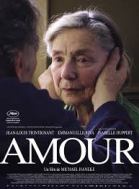 Amour is a difficult film to watch, but worth it. If you’re feeling discouraged about mortality, Amour will put things in perspective.
Amour is a difficult film to watch, but worth it. If you’re feeling discouraged about mortality, Amour will put things in perspective.
It’s a stunning film, one that stays with you. Depressing? Actually, it didn’t hit me that way, maybe because I was a bit confused about the ending, so went online to gain clarity. There I found an essay asserting this isn’t the way most of us will end our days, and the film is ageist in painting elderhood with such despair. I hope so.
The rest of this post contains some spoilage, so you might choose to stop reading here.
Anne and Georges love each other deeply and in spite of their advanced age enjoy a rich life. Then she has a stroke, at which time both of them reveal their strength and in his case, heroism.
After the first stroke, Anne reveals to Georges that she would prefer to die. She tries and fails to refuse food and liquids. Then she has a second stroke and loses the ability to enforce her decision. This is one of the main aspects of the film that resonates with me, what most of us fear – that we’ll wait too long to make the choice, or that we’ll have no choice and will have to live out our final days (years?) regardless of the impact on our loved ones.
The upside of Amour was that it put things in perspective. My aches and pains seemed laughable and my existential fears no more than childish superstitions compared to the reality portrayed in this movie. I was also left with the determination, should I ever be struck by a horrible terminal affliction, to move immediately to a state that permits me to end my life when I chose.
Did you see Amour? What did you think, and/or how did it make you feel? If you haven’t seen the trailer, here it is.
POLL RESULTS: If you’re interested in the poll results from earlier this week, click here. Thanks again for your input.
How Does It Feel to Be 82?

Dory by Sallie Bailey
I asked my friend Sallie Bailey that question because I think the more we know about aging, the less chance we’ll waste a lot of time being freaked out when we get there. Sallie is an award-winning artist and writer (here’s a link to her website). She’s practical and smart, and she said I could quote her, so here goes.
Frankly, it’s a pain. Literally. Arthritis has taken its toll. Joint replacements help but there’s a lot that brings me up short, limiting my mobility. I’m very fortunate that I’ve dodged all the major bullets – no serious health problems. The brain still functions. I firmly believe that creativity is the answer – I think we writers/artists have an enormous advantage. It’s my opinion that our ceaseless brain activity keeps that organ healthy – keeps it young. I have more ideas than I can carry to fruition. Time can be a problem there – but it’s always been a problem.
That brings up another facet of aging well – curiosity. Many of the normal occurrences of aging surprise me. Physical changes – some small, some more pronounced. I observe and reflect on them.
I consider myself very fortunate to have been gifted with a fine sense of the ridiculous. Laughter certainly helps. My father, mother and brother lacked that. Our youngest son and my brother’s oldest daughter have it. (The niece, knowing I’m partial to art glass, sent me on my 80th birthday an art glass marble on a little base along with the note that it was to replace any marbles I might have lost!) My husband has it – actually both arthritis and a sense of humor.
Death? I don’t like the idea of dying at all. I don’t don’t believe in an afterlife and I don’t like the idea of missing anything. On the plus side – people like us leave footprints. They may be lost but they’ll always be there to be found – art, writing, whatever. Another plus – at least someone else will have to clean out our dresser drawers………
I love what Sallie said about being curious and having so many ideas that time is a problem. As long as we’re hungry, life is good. I have another friend who’s in her early eighties and when we get together to talk about the novels we’re writing, we get so excited we talk over each other. We drink wine and rant about our ambitions and dreams.
Want to feel inspired? Here’s a short video interview with a 94-year-old artist who’s making money on his paintings. Thanks to David Kanigan for the lead.
Readers, I’m curious. What is it like being your age?


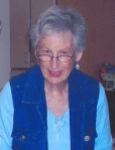
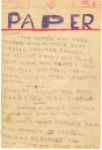
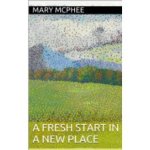






Recent Comments